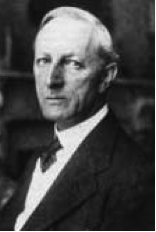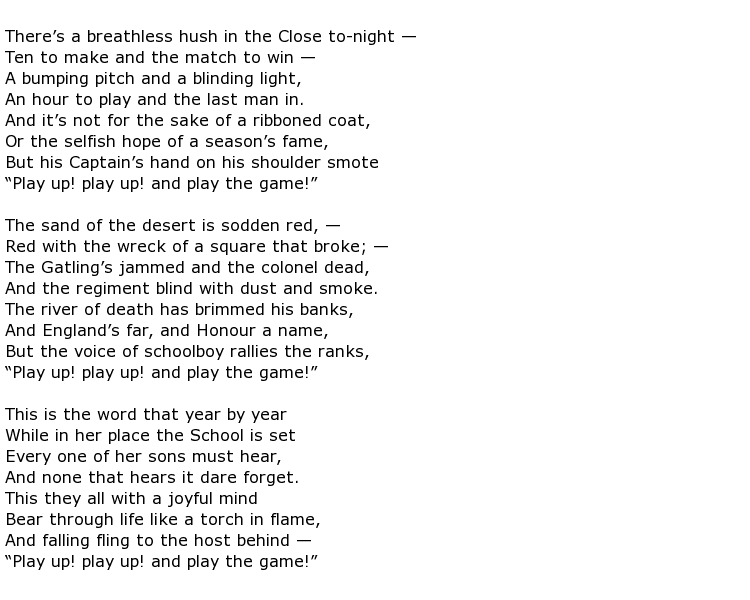 If you could pick an “establishment” character to personify all that was great about England and the British Empire during the Victorian and Edwardian eras it would probably be Sir Henry Newbolt. Although his domestic life flew in the face of “normality”, he was the archetypal English gentleman who stood up for traditional values in behaviour and standards. As a poet he produced the evocative Vitaï Lampada which compared how a true Englishman might cope with adversity on the cricket field to that found on the battle fields of Africa and beyond. As a government adviser he figured prominently in the propaganda department set up during the First World War which sought to “soften” the war message for the general public. Later on, he became an authoritative figure in the establishment of English Literature teaching standards.
If you could pick an “establishment” character to personify all that was great about England and the British Empire during the Victorian and Edwardian eras it would probably be Sir Henry Newbolt. Although his domestic life flew in the face of “normality”, he was the archetypal English gentleman who stood up for traditional values in behaviour and standards. As a poet he produced the evocative Vitaï Lampada which compared how a true Englishman might cope with adversity on the cricket field to that found on the battle fields of Africa and beyond. As a government adviser he figured prominently in the propaganda department set up during the First World War which sought to “soften” the war message for the general public. Later on, he became an authoritative figure in the establishment of English Literature teaching standards.
He was born Henry John Newbolt on the 6th June 1862, in the town of Bilston which is located near Wolverhampton in the West Midlands. His father was the vicar of his local church and Henry was sent to a grammar school at nearby Walsall. His school days were completed in Lincolnshire at Caistor Grammar School and it was here that he won a scholarship to the famous Clifton College in Bristol. The college Close was the setting for his famous Vitaï Lampada poem, written in 1897, although in this case the term “Close” refers to the college cricket field.
It is a stirring poem which was very popular throughout the country until the true horrors of WWI became apparent. It describes the challenge faced by a young cricketer whose team need ten runs to win a match, with the last two batsmen at the crease. The young man is inspired by his captain’s mantra “Play up, play up and play the game”. In other words do your best and play by the rules. According to Newbolt, this “proper” English attitude could be taken onto the battle field but, of course, that assumes that your enemy is playing by the same rules. Clearly this was not so as grisly tales of trench warfare emerged. The concept of “play the game” did survive though well into the 20th century until more cynical, less “gentlemanly players”, changed the rules of sport (and life in general), and not for the better. Here is the poem:

Newbolt went on to Corpus Christi College at Oxford and then entered the law profession. His otherwise respectable image was somewhat tarnished with his home life where it turned out that his wife was conducting a lesbian affair with a childhood close friend, with Newbolt’s full knowledge. The three embraced the situation and subsequently engaged in “ménage à trois” activities and seemed to live happily with it.
As well as being a poet specialising in stirring messages, Newbolt was a novelist and historian and also the editor of such publications as the Monthly Review. He was awarded a knighthood in 1915 while heading up the telecommunications department at the Foreign Office and he was further honoured with the title of Companion of Honour in the early 20’s. He later featured as a government adviser, particularly on Irish policy as well as being an active campaigner in the establishment of proper standards of teaching the English language.
Sir Henry Newbolt passed away on the 19th April 1938, aged 75.

